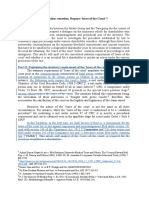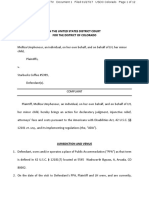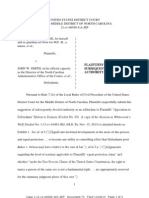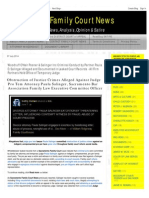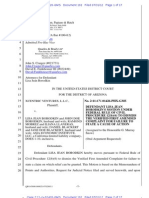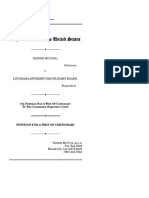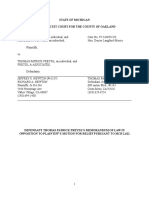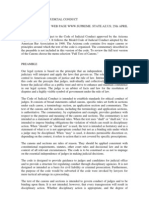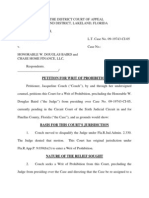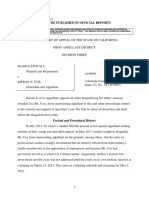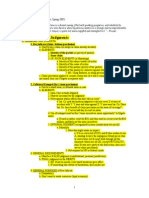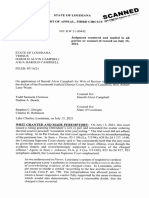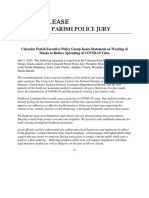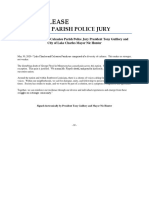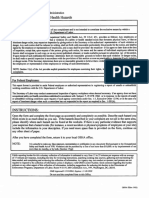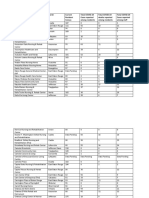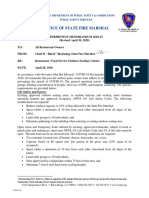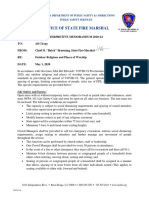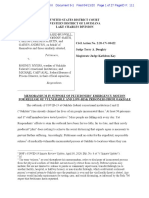100%(2)100% found this document useful (2 votes)
14K views18 pagesMotion To Quash
Defense attorneys for Dennis Jerome Bartie are asking for his second-degree murder charges to be thrown out.
Uploaded by
mcooperkplcCopyright
© © All Rights Reserved
We take content rights seriously. If you suspect this is your content, claim it here.
Available Formats
Download as PDF or read online on Scribd
100%(2)100% found this document useful (2 votes)
14K views18 pagesMotion To Quash
Defense attorneys for Dennis Jerome Bartie are asking for his second-degree murder charges to be thrown out.
Uploaded by
mcooperkplcCopyright
© © All Rights Reserved
We take content rights seriously. If you suspect this is your content, claim it here.
Available Formats
Download as PDF or read online on Scribd
You are on page 1/ 18
STATE OF LOUISIANA. : 4TH JUDICIAL DISTRICT COURT
VS. NO. 12615-16 : PARISH OF CALCASIEU
DENNIS JEROME BARTIE 7 STATE OF LOUISIANA
FILED:
DEPUTY CLERK OF COURT
MOTION TO QUASH
NOW INTO COURT, comes the defendant, DENNIS JEROME BARTIE, through
undersigned counsel, who, pursuant to Fifth, Sixth and Fourteenth Amendments to the
United States Constitution, La. Const. Art. 1, §2and La. C.Cx-P. Art. 532etseq,, moves fora
dismissal of the prosecution against him by this Court for the following reasons to wit:
INTRODUCTION
Even prior to the State's initial interview with the defendant on May 31, 2016, the
Government (the State and law enforcement) conspired to violate the defendant's rights —a
pattern of government misconduct that continued, worsened, and came to involve evena
member of the trial court itself, Indeed, from the very start and throughout this case, the
Government flagrantly attacked and flouted this defendant's rights —his right to counsel,
his right to remain silent, his right to due process, his right to fundamental fairness—each
time without the slightest hesitation or check. Indeed, in the time it takes to familiarize
oneself with all of the misconduct and rights violations present in this case, one might
completely forget the fact that the same State guilty of violating all of these rights, is the
same State constitutionally obligated to protect them.
‘The law for sucha situation is clear—if egregious enough, a trial court by way of its
supervisory jurisdiction can dismiss a case based on any of the following grounds:
1) Government misconduct;
2) Violation of defendant's right to due process;
3) Violation of defendant's right to fundamental fairness, which itself is a form
of due process violation but has various additional forms;
4) Outrageous law enforcement action; and
5) Prosecutorial misconduct.
As this Court will see below, associated with each of these specific grounds are
instructive bodies of case law, with prosecutorial misconduct (when raised as the only
ground) being the most challenging to prove and, in turn, most sparingly applied.
Regardless, in the case at bar, every one of the previously enumerated grounds is present
and overtly exhibited by the record. Indeed, the law would allow dismissal for several of
the State's actions if considered in isolation. For the same reasons, the totality of
circumstances places this Court ina situation very similar to that described by Mr. Clemons
at the close of the Motion to Suppress hearing in September of 2017:
“You have tomake a very tough decision. I think based on the facts and the law it’s
an easy decision, butit’s a tough call.” (Exhibit A, September 19,2017 Transcript, pg.
35).
Whatever the difficulty, the actions by the Government in this case cannot be
tolerated, considered harmless or rendered anything less than fatal to this case. On the
contrary, our system of justice, to be considered a justice system at all, when faced with
such misconduct, must be willing to boldly identify same as illegal, illegitimate, and the
antithesis of justice. For the same reasons, this Court is called on to take the only action in
this case that will preserve society's sense of justice — dismissal. Doing so will remedy the
violations in the only way possible, preserve judicial integrity, and deter future illegal
conduct by these same and other similarly situated Government actors.
GOVERNMENT MISCONDUCT IN THIS CASE
The so-called “confession”
Prior to interviewing the defendant on May 31, 2016, experienced, knowledgeable,
high ranking law enforcement officers met with a high ranking, experienced,
knowledgeable prosecutor with the District Attorney’s Office. Together, they drafted a
letter designed to induce, threaten, and coerce the defendant into incriminating himself.
(Exhibit B, Former Dep. Chief Kraus's testimony from the September 5, 2017 Motion to
Suppress Transcript, pgs. 17-18).
‘As the court may recall, 48 minutes into the interview on May 31, 2016, when the
defendant sought to exercise his right to remain silent, his right to counsel, and requested
numerous times to leave the interview, law enforcement brazenly ignored such and went
so far as to escalate their methods with repeated death threats. They then held the
defendant hostage for seven (7) hours.
During the ensuing seven hours of coercion, the officers incrementally fed the
defendant detailed facets of a story, they, themselves, concocted. Once they broke the
defendant's will, they made him regurgitate the story back to them and called it a
confession. As if this wasn’t enough, in a grotesque lack of restraint, the officers then
immediately held a press conference and celebrated this atrocity to the public— proudly
proclaiming that the defendant had confessed (to their story). (Exhibit C). They failed to
mention that the “confession” had been obtained through violating the defendant's
constitutional rights and through coercion.
Win at all costs
When faced with a Motion to Suppress the confession, the State’s prosecutor(s),
chose to ignore the law, defend the officer's actions and claim in court that the officers’
actions were wholly appropriate and in compliance with every applicable law and
standard. Consider some of the State’s quotes from the Motion to Suppress hearing and
from briefs submitted to the trial court prior to the hearing:
“The defendant's statements to law enforcement officers were given freely,
voluntarily, knowingly, and willingly in compliance with every applicable law and
standard for their admission.” (Exhibit D, pg. 14)
“Suppression under Article 703 of the Code of Criminal Procedure requires a
constitutional violation. There has to have been a fundamental constitutional right
that the defendant was somehow deprived of, that it was violated, and that resulted
in this statement. That's not what happened here.” (Exhibit A, September 19, 2017
Transcript, pg. 9).
“What is important to note is thataall the revelation that was done in this case by the
defendant, all the discussion that was done in this case by the defendant was
voluntary. Itwas free and voluntary.” (Exhibit A, September 19, 2017 Transcript,
pg. 10).
“"Ié somebody invokes right to counsel, we know what the rules are. Those are
much clearer for law enforcement to follow. You stop. If they invoke the right to
counsel, and they do so clearly, you stop the interrogation and you get them a
lawyer. We didn’t have any sign of that here. Law enforcement has to be able to
ascertain that the defendant truly wants toremain silent, and we didn’t have that in
this case.” (Exhibit A, September 19, 2017 Transcript, pg. 17).
“With regard to these claims about them browbeating him and then coercing him,
and him feeling threatened, that’s not what the tape shows.” (Exhibit A, September
19, 2017 Transcript, pg; 21)
“At no point in time did the defendant actually invoke the right to remain silent.”
(Exhibit A, September 19, 2017 Transcript, pg. 54)
3
‘These statements by the State were blatantly false. It’s not as if the State wasn’t privy tothe
misconduct, The State directly participated in the misconduct before, during, and after the
misconduct.
Still, the State chose to defend these actions with lies and attempts to distort the
record. The trial court then joined in on the action when, at the conclusion of the Motion to
Suppress hearing, it too made a blatantly false statement—"the defendant was never
intimated or indicated in any way he would say whatever it would take to end the
interview.” (Exhibit A, September 19, 2017 Transcript, pgs. 60-61). This “finding” coming
after the trial court claimed to have watched the interrogation video twice wherein the
defendant actually said numerous times that he would say whatever it would take to end
the interview. (Exhibit A, September 19, 2017 Transcript, pg. 59).
Continuing to fight for Injustice
After defense counsel filed its Writ of Review to the Third Circuit asking it to
overturn the trial courts obviously wrong decision, the State continued its presentation of
falsehoods. Consider a small sampling of the State’s quotes in brief to the Third Circuit:
“The defendant asserts that he was threatened with death if he did not cooperate
he Jaw enforcement officers, but that is not what occurred here,” (Exhibit E, pg.
“The defendant was also treated with great courtesy and respect by the
interrogating officers, and he was given food, water, and bathroom breaks. Every
applicable law has been adhered to in this case, and every requirement for the
admissibility of the defendant's inculpatory statements has been met, as the trial
court ruled.” (Exhibit E, pg. 18).
These statements are false—not argument —false. In truth, rights were violated and
laws broken—the same laws and rights the State was dutybound to defend. Rather, in
direct opposition to this privilege entrusted to them, the Government concealed the truth
and misrepresented evidence in complete disregard for the law.
‘The Third Circuit quickly ruled to correct same, determining the officer's
misconduct was “the very type of police misconduct the Supreme Court prohibited in
Miranda v. Arizona, 384 U.S. 436, 86S.Ct. 1602 (1966) and Michigan. Mosley, 423 US. 96, 96
S.Ct. 321 (1975)." (Emphasis added) (Exhibit F). Undeterred, the State asked the Supreme
Court to overturn the appellate court. The Supreme Court denied writs.
4
We just can’t help (or police) ourselves. Injustice be damned, we really oant that statement
Next, the State came back to the trial court and argued the confession was still
admissible because such was only a technical Miranda violation and was otherwise free and
voluntary. Once again—false. No reasonable human being, let alone a trained, experienced
prosecutor, oran experienced judge, could think that the nearly eight-hour video showed a
free and voluntary statement beyond a reasonable doubt. Some things in our line of work
are strikingly clear— this is one of those things. Still, the trial court once again ruled in the
State's favor with respect to the confession.
Again, the defendant was forced to take decision up on review and the State once
again tried to distort the record. Consider the following from the State's writ opposition:
“"In this case, the defendant asserts that he was threatened with death if he did not
cooperate with law enforcement officers, but that is not what occurred here.
(Defendant's brief, pages 12-19). Instead, officers used strategic deception as an
interrogation tactic. While the defendant contends that there were improper
promises or inducements in this case, the record establishes otherwise.” (Exhibit,
PS: 9)
"The defendant does get upset at some point during this exchange due to the
realization of evidence against him. It appears to have no relation to the
information about the mythical death penalty he faced.” (Exhibit G, pg, 12).
The Third Circuit would eventually overturn the trial court in a stunning rebuke,
finding the statement not free and voluntarily “for a variety of reasons.” Consider the
following excerpts from the Third Circuit's ruling:
“The record clearly fails to support the trial court's ruling that Defendant's
confession was freely and voluntarily given. This court previously ruled the
confession inadmissible because police behavior ran afoul of Miranda and
‘Mosely. The basis of that finding established that the confession was not free and
voluntary although, as we have said, those express terms were not used in the
court's disposition of the writ. Additionally, when a confession is obtained
through promises or inducements, itis not given freely and voluntarily, and the
State must specifically rebut the defendant's claims before such a confession
may be admitted. See State v. Serrato, 424 So.2d 214 (La.1982). Defendant was
presented with a promise, signed by the District Attorney's Office, that the State
would not seek the death penalty in exchange for Defendant's confession, names
of any and all other participants, and Defendant's polygraph verification of his
statements. Subsequently, Deputy Chief Kraus continually altered the
conditions of the deal. In fact, Defendant wasajuvenile at the time of the alleged
crime, and he could not be subjected to the death penalty.
This offer constituted impermissible inducement. Additionally, for nearly seven
hours Defendant was repeatedly told he faced execution and that he was indeed
the guilty party. Defendant repeatedly declared thathe no longer wanted to talk
to his interrogators, but the inquisition continued apace without stopping or
acceding tohis wishes. Defendantrepeatedly stated totheinterrogators thathe
was just trying to tell them what they needed sohe could gohome. Allofthese
factorstaken together leave no doubt that Defendant's confession wasnotfree
and voluntary and cannot beused againsthim forany purposeinthestate's case
inchief, (Exhibit H, pgs. 2-3)
We additionally make clear that the trial court's ruling which seems to bootstrap
Defendant's reference on June 1 about being "relieved to get this off his chest" with
his earlier confession is also improper. Defendant points out this statement to the
jailer made the day after his interrogation has no value and has no meaning without
reference to his illegal confession the day before. We again declare Defendant's
confession was not free and voluntary for a variety of reasons and thus it cannot
be used for any purpose as evidence or in any way be admitted at trial in the
state's case in chief or for the purpose of impeachment. The State cannot use
Defendant's remark on June 1 as a backdoor avenue to show his illegal confession
on May 31 to thejury.” (Emphasis added) (Exhibit H, pgs. 2-4).
Inthe meantime, however, in another incredible lack of restraint, the State urged the
court to deny the defendant expert funding based on his false confession.
Using injustice to further injustice — taking the fight to fundamental fairness,
After the State announced its intent to call a number of expert witnesses, the defense
filed pleadings to have the defendant confirmed indigent so as to obtain access to funds for
its own expert witness. In response, the State argued because the defendant had confessed
to the crime, he shouldn’t get an expert—that such would be “an exercise in futility.” The
State argued, after the Third Circuit had held the “confession” was inadmissible:
“The defendant confessed to committing the instant offense, and expenditure of
funds on any such experts would be an exercise in futility.” (Exhibit I, pg. 2).
What's more, Holland then went on television and voiced his nonsense to the public:
“Its amazing to me that they, the criminal defense lawyers here have the chutzpah
to ask for an expert witness. Not only is there DNA linking the offender to the
murder, there is fingerprint evidence linking him to the murder, and he confessed to
the murder.”
“Why should he [trial judge] order somebody to spend money on a DNA expert
when all of the evidence says that it’s a waste of money?” (Exhibit J).
Needless to say, a clear pattern had developed with respect to the State's willingness
to go on the news and promote pure falsehoods. That is, much like the police did the day
after the illegal confession was obtained, Holland continued to parade on the news,
repeating ad nauseum that the defendant had confessed to the crime, knowing that the
‘Third Circuit had declared it inadmissible and that it was not free and voluntary. Further,
in both courtand on TV., he continuously promoted the notion that because defendanthad
“confessed” to the crime, he ought not be provided an expert—that such was a “waste of
time.”
Holland’s statements were nothing short of propaganda designed to prejudice the
case and obstruct the defendant's rights. They were also a remarkable public
demonstration of the State’s willingness to not only shamelessly abandon their obligations
to that same public but ignore unfavorable rulings altogether. By all indications, the State
became consumed with a “win at all cost” mentality —to hell with the truth, we want to
win.
Not surprisingly, the trial court would go on to find the defendant was not
indigent—this yet another ruling flying in the face of black letter law and the record
evidence, even after the Public Defender, the sole arbiter of indigency, declared the
defendant was indigent in open court. The Third Circuit quickly overturned the court.
(Exhibit k).
Still, the most lethal attack on the defendant's fundamental rights is what happened
next. Itis also why this Court is called upon to fashion an appropriate remedy
The Coup D’état ~ release of previously sealed defense strategy directly
to State by way of ex parte communication between trial court and State
While making the defense jump through hoops to prove the need for an expert
witness, the trial court required defense counsel to describe with particularity the reasons
and theories upon which they would rely, and for which they needed expert witness
testimony. By law, these kinds of proceedings are sealed, and the District Attorney, in
particular, is barred from participating or even being in the room, because the proceedings
themselves reveal the mental impressions, strategies, and theories of counsel - the very
heart of privileged work product. During the proceedings, the trial court candidly
acknowledged the principal aim in sealing the records was to “protect the integrity of the
defense's case.”
‘Yet on September 30, 2019, the trial court granted, ex parte, and without notifying
defense counsel, request by the State to unseal the record associated with the defendant's
indigency proceedings—this despite knowing full-well that those proceedings contained
specific insight into the defendant's strategy for defending this case, including
particularized reasons for the need and intended use of expert witnesses. (Exhibit L). In
other words, the trial court forced the defendant to reveal his strategy to get funding,
acknowledged the need to protect the secrecy of it, denied the request for funding and
then secretly gave the defense strategy over to the State. The defense did not even get an
opportunity to object.
Employees of the Calcasieu Parish District Attorney's Office then immediately
proceeded to the Calcasieu Parish Clerk of Court's Office where they viewed the record of
proceedings and made copies of previously sealed/ protected documents. (Exhibit M).
Contained within these records were transcripts of particularized explanations of
Gefense counsel's strategy with corresponding exhibits. Likewise, the records include
detailed and thorough explanations of the defense’s need for and intended use of experts
together with specific reference to evidence previously turned over by the State which the
defense intended to counter. Point being, irreparable damage was imposed on the
defendant's right of due process, his right to a fundamentally fair process, his right to
counsel, and his attorney work product privilege
What did you expect?
In response, defense counsel quickly moved and was successful in having Judge
Canaday recused, Still, in anticipation of this Motion, defense counsel also made a public
records request to the trial court on March 9, 2020 seeking the following:
“Any and all emails sent by you and/or Rhonda Taylor to any employee and/or
attorney of the Caleasieu Parish District Attorney’ s Oifice between August 15, 2019
and October 15, 2019 in regard to the State of Louisiana v. Dennis Bartie case and the
State's filing of a Motion to Unseal.” (Exhibit N)
Thereafter, on March 11, 2020, the defendant received the following response from
Judge Canaday:
“Dear Mr. Johnson:
Thave received your Public Records Request dated March 9, 2020. At this time I do
not believe the items you are requesting would fall within public records. I have
contacted other members of the Court and they share my concerns due to the rules
we are guided by under the Supreme Court.
3
‘The Supreme Court does not allow us to comment on cases in existence that are
ongoing. And, further, we are not even allowed to testify or give information
without contradictory hearings. At this time your request is declined for those
reasons.
When I discussed this matter with the Court it appears to be one of first appearance
and the case you cited is distinguishable. Ithas to do with a transcript that would be
a court proceeding.
Please pursue whatever measures you think would be appropriate.” (Exhibit O).
In response, that same day defense counsel sent the Calcasieu Parish District
Attorney's Office a similarly worded public records request. (Exhibit P). Notwithstanding,
on March 13, 2020, defense counsel received a second response from Judge Canaday:
“Dear Mr. Johnson:
I apologize but I have been in a jury trial all week that is extending into next week.
After a more thorough review of your March 9, 2020 correspondence, I can
adequately respond to your specific request of ‘any and all emails sent by you
and/or Rhonda Taylor to any employee and/or attorney of the Calcasieu Parish
District Attorney’ s Office between August 15, 2019 and October 15, 2019 in regard to
the State of Louisiana v. Dennis Bartie case and the State's filing of a Motion to
Unseal’
There are no emails sent by me and/or Rhonda Taylor to any employee and/or
attorney of the Calcasieu Parish District Attorney’ Office between August 15, 2019
and October 15, 2019 in regard to the Siate of Louisiana v. Dennis Bartie case and the
State's filing of a Motion to Unseal.” (Exhibit Q).
On March 19, 2020, defense counsel received its response from the Calcasieu Parish
District Attorney’s Office, which included an email from Judge Canaday to an employee of
the Calcasieu Parish District Attorney’ Office dated September 16,2019, 3:35 p.m. (Exhibit
R). The subject line reads “Re: Dennis Bartie - Funding Writ Ruling KW 19-598,” The email
from Judge Canaday appeared to be in response to receiving a forwarded email from an
employee of the district attorney's office attaching the Third Circuit's ruling overturning
the trial court's indigency determination. Judge Canaday’s response read as follows:
“If the state wants to take up to the Supreme Court, I will unseal the record. GMC”
Important to note is defense counsel was not courtesy copied on any of the emails
received pursuant to the public records request and sent between the Caleasiew Parish
District Attorney's Office and the trial court judge.
Equally concerning is the State's silence during the recusal hearing regarding these
exparte emails. After all, when asked directly by this Court during the recusal hearing why
9
the State filed the Motion to Unseal in the first place, this Court should recall that the
State's response was that such was irrelevant for purposes of the Motion to Recuse
proceeding. False. The fact the State filed the ex parte Motion to Unseal following ex parte
communications with the trial court was entirely relevant. Indeed, defense counsel had
already tried to subpoena this very information from the district attorney’ office. (Exhibit
S), The State knew it was relevant and once again, it chose to conceal the truth.
These actions by law enforcement, the State, and the trial court constituted extreme
and outrageous government misconductand violated defendant's right to due process and
fundamental fairness. Likewise, such conduct demands a remedy from the trial court.
Dismissal of the prosecution by the trial court is the only appropriate remedy.
THE LAW
Again, the law is clear—if egregious enough, a trial court by way of its supervisory
jurisdiction has the authority to dismiss a case based on any of the following grounds:
1) Government misconduct;
2) Outrageous law enforcement action
3) Violation of defendant's right to due process;
4) Violation of defendant's right to fundamental fairness, which itself is a form
of due process violation but has various additional forms; and
5) Prosecutorial misconduct.
GOVERNMENT MISCONDUCT
In certain prescribed instances the Government is estopped from bringing a
prosecution because of their own misconduct. See Rochinv. People of California, 342US. 165,
72S,Ct. 205, 96 L.Ed. 183 (1952). Hampton v. ULS., 425 US. 484, 96 S.Ct. 1646, 48 L.Ed.24 113,
(1976); U.S. v. Graves, 556 F.2d 1319 (Sth Cir, 1977). Accordingly, the defense of
government misconduct is a court created limitation upon the activities of the government
in the court's exercise of its supervisory jurisdiction over the administration of criminal
justice. US.C.A. Const. Amend. 14, State v. Caldwell, 616 $0.24 713 (La. App. 3rd Cir-1993);
State v. Lee, 778 So2d 656 (La. App. 4 Cir. 1/4/01). In other words, the defense of
government misconduct is a remedy created by the courts to protect the public against
government misconduct in the absence of any other available remedies, and in light of the
State's inability, in some cases, to police itself against misconduct
‘The issue of whether or not the prosecution of a defendant should be barred as a
result of government misconduct or overreaching is a question of law. Id. Likewise, the trial
judge must decide if governmental misconduct is so outrageous or fundamentally unfair
that it deprives a defendant of due process. Id. See also U.S. v. Yater, supra; and U.S. 2.
Graves, supra. A motion to quash is a proper procedural vehicle to assert a claim of
governmental misconduct. State v. Caldwell, supra; State v. Smith, 614 S0.2d 778 (La. App.
24 Cir, 1998); State v, Boyd, 548 So.2d 1265 (La. App. 24 Cir. 1989); State v. Marks, 508 So.2d
32 (La. App. 1% Ciz, 1986).
OUTRAGEOUS LAW ENFORCEMENT ACTION
A court may also dismiss an indictment when the conduct of law enforcement
agents is so outrageous that due process principles would absolutely bar government from
invoking judicial process to obtain a conviction. United States 0. Russell, 411 US. 423, 431-
32, 93 S.Ct. 1637, 1643, 36 L.Ed.2d 366 (1973); Linited States 0. Simpson, 813 F.2d 1462, 1464
(9th Cir.) cert. denied, 484 U.S. 898, 108 S.Ct. 233, 98 L.Ed.2d 192 (1987) (Simpson I). To
constitute a Fifth Amendment violation under Russell, the government conduct at issue
must be fundamentally unfair and “’shocking to the universal sense of justice’ mandated
by the Due Process Clause of the Fifth Amendment.” Russell, 411 U.S. at 432, 98 S.Ct. at
1643 (quoting, Kinsella v. United States, 361 US. 234, 246, 80 S.Ct. 297, 304, 4 L.Ed.2d 268
(1960). “[T]he determination of when the government's behavior reaches such a
‘demonstrable level of outrageousness’ to constitute a due process violation is ‘at best
elusive.” United States v. Bogart, 783 F.2d 1428, 1435 (9th Cir.1986), vacated on other
grounds, U.S. v. Wingender, 790 F.2d 802 (9th Cir.1986) (quoting LInited States v. Jonnotti, 673
F.2d 578, 606 (3d Cir.) (en banc), cert. denied, 457 U.S. 1106, 102 S.Ct. 2906, 73 LEd.24 1315
(1982)). Therefore, every case must be resolved on its facts. Bogart, 783 F.2d at 1438,
Whether outrageous government misconduct exists turns on the totality of the
circumstances. United States v. Tobias, 662F.2d 381, 387 (5th Cir.1981), cert. denied, 457 US.
1108, 102 S.Ct. 2908, 73 L.Ed.2d 1317 (1982).
ul
In United States v. Batres~Santolino, 521 F Supp. 744, 750-53 (N.D.Cal.1981), Russell
was invoked to dismiss an indictment resulting from outrageous government misconduct
which induced the defendant to commit a crime. See also Bogart, 783 F.2d at 1434-38
(discussing the history of the doctrine’s evolution and application). However, because the
Ruscel! doctrine is grounded in the due process clause of the Fifth Amendment, it may be
applied in cases where government interference in an attorney-client relationship is so
shocking to “the universal sense of justice” that it violates due process. See United States v.
Ofehe, 817 F.2d 1508, 1516 (11th Cir.1987). Three legitimate bases for court's exercise of its
supervisory power are: to remedy violation of statutory or constitutional right; to preserve
judicial integrity; and to deter future illegal conduct. Id, What could be more outrageous to
fundamental faimess than threatening a person with death if he refuses to confess to a
crime?
DUE PROCESS AND FUNDAMENTAL FAIRNESS
The concept of “due process” is rooted in the canons of decency and fairness, which
express the notions of justice of English-speaking people. US.C.A.Cons.Amend. 14. See:
Rochin v, People of Calif, 342 US. 165, 72 S.Ct. 205, 96 L-Ed. 183 (1952). The courts are
responsible for ensuring that fundamental fairness is preserved, See Linited States v. Graves,
356 F.2d 1319 (Sth Cir,, 1977). This is a cornerstone of our nation - that the courts act as a
check against intrusions on liberty by the State.
To declare a denial of due process, a court must find that the absence of fundamental
fairness fatally infected the trial, or that the acts that occurred were so egregious as to
necessarily prevent a fair trial. State v. Papizan, 256 So.2d 1091 (La. App. 1 Cir. 11/2/17).
Likewise, a Fifth Amendment due process violation may occur when government
interference in attorney-client relationship results in ineffective assistance of counsel or
when government engages in outrageous misconduct. US. v. Marshank, 777 F Supp. 1507
(1991). An appropriate remedy for a Fifth Amendment violation is generally suppression of
evidence; however, dismissal is appropriate where continuing prejudice from
constitutional violation cannot be remedied by suppression of evidence. Id. US.C.A.
Const. Amend. 5,
12
Defining fundamental fairness as it relates to due process has plagued courts for
some time, as such an analysis is a fact-intensive inquiry, as the Louisiana Fifth Circuit has
noted. State v. Gravois, 17-341 (La. App. 5 Cir. 12/13/17); 234 So. 3d 1151, 1163
Due process "is not a technical conception with a fixed content unrelated to time,
place and circumstances." Rather, the phrase expresses the requirement of
"fundamental fairness," a requirement whose meaning can be as opaque as its
importance is lofty. Applying the Due Process Clause is therefore an uncertain
enterprise [that] must discover what "fundamental fairness" consists of in a
particular situation by first considering any relevant precedents and then by
assessing the several interests that are at stake. Id.
Courts have recognized the following as fundamentally unfair, including: admission of
coerced confessions, discovery inequality, misuse of prosecutorial power, denying a
defendant the opportunity to have an expert of his choosing to testify at his trial,
prosecutorial misconduct, unfair allotment practices, unfair bargaining in criminal
proceedings, subjecting criminal defendants to numerous criminal trials after hung juries,
decreased jury size and outrageous government conduct. Lisenbav. California, 314 US. 219,
237-238 (1941); Wardius v. Oregon, 412 US. 470,471 (1973); State v. Reimoneng, 2019-0367 (La.
10/22/19); 286 So. 3d 412, 416-417; Barnard v. Henderson, 514 F.2d 744, 746 (5th Cir. 1975);
State v. Gravois, 17-341 (La, App. 5 Cir. 12/13/17); 234 So. 3d 1151, 1163; State v. Nunez,
2015-1473 (La. 01/27/16); 187 So. 3d 964, 969-970; State v. Karey, 2016-0377 (La. 06/29/17);
232So. 3d 1186, 1190, State v. Kyles, 97-2660 (La. App. 4 Cir. 01/21/98); 706 So. 2d 611, 614
(noting that Louisiana courts have the power and discretion to bar retrials under certain
circumstances where “enough is enough.”). Too many of these hallmark acts of
fundamental unfairness have occurred in this one case.
PROSECUTORIAL MISCONDUCT
Courts have determined that a due process violation by the prosecutor, amounting
to prosecutorial misconduct, may result in dismissal if the misconduct is outrageous
enough to prevent or impede a fair trial.
[Flair play.... is the essence of due process.” Galvan v. Press,347 US. 522, 530,74S.Ct.
737, 98 L.Ed. 911 (1954). Such fair play includes “the deep-rooted feeling that the police
must obey the law while enforcing the law; that in the end life and liberty can be as much
endangered from illegal methods used to convict those thought to be criminalsas from the
13
actual criminals themselves.” Spano v. New York, 360 US. 315, 320-21, 79 S.Ct. 1202, 3
L.Ed.2d 1265 (1959). This deep-rooted feeling extends even deeper where prosecutors are
concerned, given their status as officers of the court bound to special rules of professional
conduct. See, e.g,, La. Rules of Professional Conduct, Rule3.8 (Special Responsibilities ofa
Prosecutor).
In re Jordan, 04-2397 (La. 06/29/2005), 913 So.2d 775, 781
In our system of justice, we entrust vast discretion to a prosecutor. In re Toups,
2000-0634 p. 10 (La. 11/28/00), 773 So.2d 709, 715. Because a prosecutor is given
such great power and discretion, he is also charged witha high ethical standard. Id.
A prosecutor stands as the representative of the people of the State of Louisiana. He
isentrusted with upholding the integrity of the criminal justice system by ensuring
that justice is served for both the victims of crimes and the accused. “Society wins
notonly when the guilty are convicted but when criminal trials are fair; our system
of the administration of justice suffers when any accused is treated unfairly.” Brady,
373 US. at 87, 83S.Ct. 1194.
The reasons for prosecutorial self-restraint are manifest.
Although ‘[s]tatements to the press may be an integral part of a prosecutor'sjob, and
.. may serve a vital public function’ that function is strictly limited by the
prosecutor's overarching duty to do justice.' Those who wield the power to make
public statements about criminal cases must ‘be guided solely by their sense of
public responsibility for the attainment of justice.”
Aversa 0, United States, 99 F.3d 1200, 1216 (1st Cir.1996) (quoting Souza v. Pina, 53 F.3d 423,
427 (Ist Cir.1995)). Insulating the prosecution and trial from bias, prejudice,
misinformation, and evidence revealed outside the courtroom are crucial to the fairness of
our processes. Equally important, the prosecutor must respect the presumption of
innocence even as he seeks to bring a defendant to justice. ULS. v. Boren, 799 F.3d 336.
Justice Sutherland eloquently captured the prosecutor's calling.
A government prosecutor is the representative not of an ordinary party to a
controversy, but of a sovereignty whose obligation to govern impartially is as
compelling as its obligation to govern at all; and whose interest, therefore, in a
criminal prosecution is not that it shall win a case, but that justice shall be done. As
such he is in a peculiar and very definite sense the servant of the law, the twofold
aim of which is that guilt shall not escape or innocence suffer. He may prosecute
with earnestness and vigor —indeed, he should do so. But, while he may strike hard
blows, he is not at liberty to strike foul ones. It is as much his duty to refrain from
improper methods calculated to produce a wrongful conviction as it is to use every
legitimate means to bring about a just one.
Id, Also, Berger 0. United States, 295 US. 78, 88, 55S.Ct. 629, 79 LEd. 1314 (1935), overruled
onother grounds by Stirone v. United States, 361 US. 212, 80 S.Ct. 270, 4 L.Ed.2d 252 (1960).
‘These are the very principles and actions that the State has repeatedly, willfully, and
intentionally flouted in this case. The State has regularly made intentional
misrepresentations, both in court and in public, referred to evidence that has been declared
inadmissible, again in court and in the press, and engaged in ex parte communications
designed to infringe upon attorney work product so as to gain an unfair advantage at trial.
In United States v. Stein, 541 F.3d 130, 139-140 (2d Cir. 2008), dismissal due to
prosecutorial misconduct was proper where the misconduct infringed on the defendants’
right to counsel. In Stein, multiple defendants (employees of KPMG) were indicted on a
number of offenses, including fraud, tax evasion, and obstruction ofjustice. In the course of
the case, the Government placed pressure on KPMG to cap and limit the legal fees it paid to
the defendant's lawyers. Id. at 143-144. The district court determined that absent KPMG's
updated legal fee policy, revised at the behest of the Government, KPMG would have
“advanced [legal] fees without condition or cap.” Id
The court ultimately found KPMG 's limitation of defendant's legal fees was directly
attributable to Government action, Id. at 146-147. The Court agreed that “the government
unjustifiably interfered with their relationship with counsel and their ability tomount “the
best defense they could muster.” Id. at 154. As such, the government action violated the
defendants’ Sixth Amendment right to counsel and hindered their ability to properly
defend themselves. Id. at 157. The court affirmed the district court's decision to dismiss the
indictments based on government misconduct. Id.
DISCUSSION OF REMEDIES
Recusal of District Attorney as a remedy
Recusing the district attorney would be an insufficient remedy for what hopefully is
an obvious reason by now. It would tell the defendant that his remedy for all of these
flagrant violations is to simply take the word of the offending party that they won't share
sensitive defense strategy with another State counterpart. That, under the circumstances of
this case, would be telling the defendant simply to take the word of the same people who
threatened him with death if he didn’t confess, lied about it in court, and gained improper
access to the sensitive information in the first place. Every facet of the governmental entity
that is in place to protect his rights has failed this defendant in this case. As such, asking
him to rely on the protection of the same governmental entity, just one under a different
roof, is simply not an acceptable remedy.
Suppression of the DNA and Fingerprint Evidence
In full transparency, suppressing the DNA and fingerprint evidence might likely
result in the case being dismissed. However, any remedy less than dismissal would leave
the offending party responsible for deciding whether the case continued and allow them to
do so with the benefit of all of their false representations to the media regarding the case.
Given the State's actions, they should no longer have that right nor should the defendant
continue to suffer from any effects of their misdeeds. Given multiple, unmistakable
examples of government misconduct—numerous, brazen violations of due process and
fundamental fairness— prosecution in this case should be foreclosed by the trial court.
CONCLUSION
In the case at bar, we have multiple, unmistakable examples of government
misconduct—numerous, brazen violations of due process and fundamental fairness—
outrageous law enforcement action—and rampant prosecutorial misconduct. To that end,
there is nothing that can now be done to remedy the obvious interference these actions
have placed on the defendant's fiith amendment right to counsel. For these reasons, this
case should be dismissed, No other remedy is sufficient to return the status quo. A fair trial
is no longer achievable.
WHEREFORE, mover prays now this motion be set for hearing on a date and time
to be selected by the Court and that after due proceedings had there be judgment
dismissing the prosecution against the defendant.
Respectfully Submitted,
910 Ford Street
Lake Charles, La 70601 >
(77) 433-1414 [Telephony
(337) 433.3284 /Facs aa
Sel
ADAM P. JOHNSON, #32515
TODD S. CLEMONS, #18168
JANET D. MADISON, #37495
Attorneys for Dennis Jerome Bartie
STATE OF LOUISIANA. 14TH JUDICIAL DISTRICT COURT
‘VS. NO, 12615-16 PARISH OF CALCASIEU
DENNIS JEROME BARTIE STATE OF LOUISIANA
FILED:
DEPUTY CLERK OF COURT
ORDER
Considering the foregoing:
ITIS HEREBY ORDERED thata hearing on defendant's Motion to Quash be set for
the day of at
merits of same.
‘THUS DONE AND SIGNED in Lake Charles, Louisiana this
2020.
aam./p.m. for purposes of determining the
day of May,
HONORABLE JUDGE CLAYTON DAVIS
PLEASE SERVE:
John DeRosier, District Attorney
Calcasieu Parish District Attorney’s Office
901 Lakeshore Drive
Lake Charles, LA 70601
Elizabeth Hollins, Asst. District Attorney
Calcasieu Parish District Attorney’s Office
901 Lakeshore Drive
Lake Charles, LA 70601
Hugo Holland, Asst. District Attorney
Caleasieu Parish District Attorney's Office
901 Lakeshore Drive
Lake Charles, LA 70601
Jacob Johnson, Asst. District Attorney
Caleasieu Parish District Attorney's Office
901 Lakeshore Drive
Lake Charles, LA 70601
CERTIFICATE OF SERVICE
Thereby certify that a copy of the above and forgoing Motion to Quash has been
delivered upon:
John DeRosier, District Attorney
Elizabeth Hollins, Assistant District Attorney
Hugo Holland, Assistant District Attorney
Jacob Johnson, Assistant District Attorney
901 Lakeshore Drive
Lake Charles, LA 70601
via email this 30% day of April, 2020.
ADAM P. JOHNSON
You might also like
- APPENDIX H, Petition For Writ of Mandamus FSC 2016-2031No ratings yetAPPENDIX H, Petition For Writ of Mandamus FSC 2016-203127 pages
- Sample Motion To Vacate Judgment Under Rule 60 B 2 in United States District Court100% (1)Sample Motion To Vacate Judgment Under Rule 60 B 2 in United States District Court3 pages
- Objection To John Fasone Order and Affidavit in SupportNo ratings yetObjection To John Fasone Order and Affidavit in Support51 pages
- Santa Barbara Co. Public Defender's Office Petition For Habeas Corpus + Exhibits100% (5)Santa Barbara Co. Public Defender's Office Petition For Habeas Corpus + Exhibits143 pages
- Judicial Committees - April 2025 - Systemic Constitutional Violations by Judicial Officers - District of NH / First CircuitNo ratings yetJudicial Committees - April 2025 - Systemic Constitutional Violations by Judicial Officers - District of NH / First Circuit86 pages
- Constitution.: Supporting Supreme Court Case LawsNo ratings yetConstitution.: Supporting Supreme Court Case Laws1 page
- Habeas Petition 5D23-0913 Judge Peter BrighamNo ratings yetHabeas Petition 5D23-0913 Judge Peter Brigham146 pages
- Petition for Dismissal: City of Everett v. Brandia TaamuNo ratings yetPetition for Dismissal: City of Everett v. Brandia Taamu42 pages
- 109-1 Memo in Support of Motion For Preliminary Injunction Re Domestic Violence Restraining Orders100% (4)109-1 Memo in Support of Motion For Preliminary Injunction Re Domestic Violence Restraining Orders33 pages
- Appellant's Reply To Objection To Motion To Recuse 11th Circuit Court of Appeals100% (1)Appellant's Reply To Objection To Motion To Recuse 11th Circuit Court of Appeals15 pages
- Plaintiffs' Suggestion of Subsequently Decided AuthorityNo ratings yetPlaintiffs' Suggestion of Subsequently Decided Authority13 pages
- Sacramento Family Court News: Investigative Reporting, News, Analysis, Opinion & SatireNo ratings yetSacramento Family Court News: Investigative Reporting, News, Analysis, Opinion & Satire40 pages
- Amend To Memorandum - Motion - Dismiss - WashingtonNo ratings yetAmend To Memorandum - Motion - Dismiss - Washington10 pages
- Petiton For Discretionary Review in Ford v. Texas, Texas Court of Criminal Appeals (October 15, 2014)No ratings yetPetiton For Discretionary Review in Ford v. Texas, Texas Court of Criminal Appeals (October 15, 2014)73 pages
- Paul Boyne Ruling On Defendant's Motion To Dismiss 7.15.2024No ratings yetPaul Boyne Ruling On Defendant's Motion To Dismiss 7.15.202420 pages
- Emergency Motion For Preliminary Injunctive Relief: Aaron Walker v. Brett KimberlinNo ratings yetEmergency Motion For Preliminary Injunctive Relief: Aaron Walker v. Brett Kimberlin3 pages
- 2015-11-25 Nanine McCool v. Louisiana Attorney Disciplinary Board, Writ App SCOTUS100% (1)2015-11-25 Nanine McCool v. Louisiana Attorney Disciplinary Board, Writ App SCOTUS224 pages
- Petition Writ of Mandamus Compelled Discovery100% (1)Petition Writ of Mandamus Compelled Discovery31 pages
- MOTION To Dismiss Case For Brady and Jencks Violations by DEFENDANT KENNETH JOSEPH THOMAS100% (1)MOTION To Dismiss Case For Brady and Jencks Violations by DEFENDANT KENNETH JOSEPH THOMAS14 pages
- I C J J: Nterbranch Ommission Uvenile UsticeNo ratings yetI C J J: Nterbranch Ommission Uvenile Ustice25 pages
- Anthony Pasquall FARETTA, Petitioner, v. State of CALIFORNIANo ratings yetAnthony Pasquall FARETTA, Petitioner, v. State of CALIFORNIA37 pages
- Paul Maravelias's Pro Se 2018 Reply Brief (Christina DePamphilis v. Paul Maravelias, 2018-0483)No ratings yetPaul Maravelias's Pro Se 2018 Reply Brief (Christina DePamphilis v. Paul Maravelias, 2018-0483)48 pages
- Law Students' Guide to Conflict of LawsNo ratings yetLaw Students' Guide to Conflict of Laws37 pages
- R. Doc. 120-4 - MIS Motion For Summary Judgment AgainstNo ratings yetR. Doc. 120-4 - MIS Motion For Summary Judgment Against30 pages
- Frederick Heidmann's Reply Memorandum, 18-CR-20-2969No ratings yetFrederick Heidmann's Reply Memorandum, 18-CR-20-296988 pages
- Third Circuit: Dennis Jerome Bartie RulingNo ratings yetThird Circuit: Dennis Jerome Bartie Ruling7 pages
- Louisiana Third Circuit Court of Appeal Writ Ruling in Harold Campbell Trial100% (1)Louisiana Third Circuit Court of Appeal Writ Ruling in Harold Campbell Trial3 pages
- 2022 Louisiana Teachers and Principals of The YearNo ratings yet2022 Louisiana Teachers and Principals of The Year3 pages
- 2020 Audit - Reporting On Fraud and MisappropriatonsNo ratings yet2020 Audit - Reporting On Fraud and Misappropriatons2 pages
- La. State Police - Michael Torres - Initial ReportNo ratings yetLa. State Police - Michael Torres - Initial Report1 page
- Beauregard Parish Start-of-School GuidelinesNo ratings yetBeauregard Parish Start-of-School Guidelines1 page
- PRESS RELEASE-Statement From Executive Policy Group 7-3-20No ratings yetPRESS RELEASE-Statement From Executive Policy Group 7-3-201 page
- PRESS RELEASE Joint Statement From CPPJ President Tony Guillory and Mayor Nic HunterNo ratings yetPRESS RELEASE Joint Statement From CPPJ President Tony Guillory and Mayor Nic Hunter1 page
- 5-21-20 PPE Complaint To OSHA Regarding Oakdale FCCNo ratings yet5-21-20 PPE Complaint To OSHA Regarding Oakdale FCC3 pages
- Return To Campus Plan - Revised 6-30-2020No ratings yetReturn To Campus Plan - Revised 6-30-202014 pages
- School Reconfiguration Question & Answer DocumentNo ratings yetSchool Reconfiguration Question & Answer Document3 pages
- Louisiana Department of Health COVID-19 Nursing Home ReportNo ratings yetLouisiana Department of Health COVID-19 Nursing Home Report12 pages
- Temporary Restraining Order - Oakdale Prison COVID-19 Suit - American Civil Liberties UnionNo ratings yetTemporary Restraining Order - Oakdale Prison COVID-19 Suit - American Civil Liberties Union27 pages
- Cease and Desist Order-Modification April 20 2020 Vernon ParishNo ratings yetCease and Desist Order-Modification April 20 2020 Vernon Parish1 page
- 4.13.20 Livas v. Myers Motion For A Temporary Restraining Order 1No ratings yet4.13.20 Livas v. Myers Motion For A Temporary Restraining Order 15 pages







